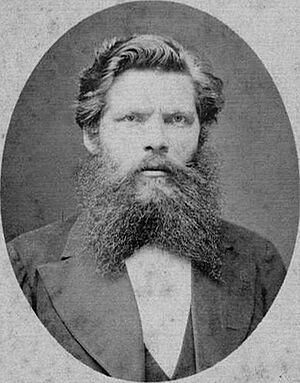Mihkel Veske facts for kids
Mihkel Veske (born January 28, 1843 – died May 16, 1890) was an important Estonian poet and linguist. He played a big part in developing the Estonian language and culture.
Life and Studies
Mihkel Veske was born on a farm in Holstre Parish, which is now part of Metsla village in Viljandi Parish, Estonia. This area was then part of the Russian Empire. He went to several local schools, including the village school in Pullerits and a secondary school in Tartu.
Later, he studied at a mission school in Leipzig, Germany, from 1866 to 1867. He then continued his studies at the University of Leipzig, where he earned a special degree called a doctorate in 1872. His doctoral work, published in 1873, was about comparing different languages. After his studies, Veske returned to Estonia and worked as a journalist for a newspaper called Eesti Põllumees.
Teaching and Language Work
From 1874 to 1887, Mihkel Veske taught the Estonian language at the University of Dorpat (which is now the University of Tartu). He then moved to Russia and taught Finno-Ugric languages at the University of Kazan from 1886 until he passed away in 1890.
During the 1880s, Veske was a key leader in the Estonian national awakening. This was a time when Estonians worked hard to develop their own culture, language, and national identity. He was part of a group of patriotic Estonian thinkers and journalists, including Carl Robert Jakobson. Veske was also the President of the Society of Estonian Literati from 1882 to 1886. In 1884, he was the editor of a magazine called Oma Maa, which means 'My Land'.
Exploring Languages
Mihkel Veske was one of the first Estonian language experts to use a special method called the comparative method. This method helps to understand how languages have changed over time by comparing them. Between 1875 and 1884, he traveled during the summers to compare different Estonian dialects. He visited Finland in 1880 and Hungary in 1885 and 1886.
He believed that a standard Estonian language should be based on the North Estonian dialect and use phonetic spelling (spelling words as they sound). While in Kazan, he studied the languages of the Mari and Mordvin people. He also looked at how the cultures of Finno-Ugric peoples and Slavic peoples were connected. From 1881 to 1883, he wrote a two-volume textbook for learning the Finnish language.
Mihkel Veske passed away in Kazan. His body was brought back to Estonia and he is buried at the Uus-Jaani cemetery in Tartu.
Poetry
Mihkel Veske's poems were often inspired by the simple beauty of traditional Estonian folk songs. He also spent time collecting folk poetry himself. He translated many folk songs from German, Russian, Finnish, and Hungarian into Estonian.
Poetry Collections
- Viisidega laulud (1874)
- Dr. Veske laulud (1899)
- Mihkel Veske laulud (1931)
 | James Van Der Zee |
 | Alma Thomas |
 | Ellis Wilson |
 | Margaret Taylor-Burroughs |


